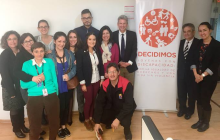By Emma York, LSJ Communications Student Assistant
LSJ faculty are driven to conduct research not only to satisfy their intellectual curiosity, but to try to make an impact in the world. As an example, take the recent work of LSJ Assistant Professor Stephen Meyers.
Meyers, who also has an appointment in the Jackson School of International Studies, recently co-authored a report for the United Nations Population Fund (UNFPA). The report, which Meyers wrote with Megan McCloskey, a graduate student in the UW School of Law, provides an analysis of the situation of people with disabilities, with a particular focus on young people.
The report was launched at the UN on September 24.
“Young persons with disabilities are some of the least able to make decisions about their body and also the least likely to be protected from sexual violence and gender-based violence,” Meyers said. “So they are at greater risk. But also the mechanisms to protect people oftentimes miss them completely.”
The report assesses various policies and practices globally in response to these issues to serve as a resource for states. The interdisciplinary work needed to conduct this research is illustrated by the combination of Meyers’ background in research on youth with disabilities and McCloskey’s background in sexual and reproductive health, and in rights- and gender-based violence work.
The research for this project began with the collection of available articles on the topic, a meeting of experts in New York to direct the focus of the report, and a series of online interviews with people doing work in relevant areas. In addition, field visits selected by the UNFPA allowed Meyers and McCloskey to run focus groups with young people and organizations in such diverse settings as Spain, Morocco, Ecuador, and Mozambique.
Both Meyers and McCloskey plan to incorporate their findings into their coursework, including a new LSJ seminar, “Gender, Disability, and Law,” to be taught by McCloskey in the upcoming winter quarter.
“Children with disabilities are almost four times more likely to become victims of violence than are children without disabilities,” the report states. “In one study in Australia, as many as 62 percent of women with disabilities under the age of 50 had experienced violence since the age of 15, and women with disabilities had experienced sexual violence at three times the rate of those without disabilities.”
Because of a common misconception that persons with disabilities are not sexual beings, they tend to be excluded from the sex education, family planning services, and healthcare services provided to their able-bodied peers. This exclusion is consequential for disease transmission, unwanted pregnancy, and understandings of a healthy relationship. As McCloskey points out, “Girls and young women in particular are vulnerable to sexual assault because they are not in a position to know what is not allowed.”
In addition to assessing the situation, the report highlights promising state practices from around the world in response to these problems. In India, the internet is used to connect and educate youth with disabilities on sexuality. Love Matters, a website that provides sex education to youth in both English and Hindi, includes a Sexual Diversity section in which disability is covered, among other topics. Sexuality and Disability, a second website originating in India, addresses those with disabilities, with a particular focus on young women with disabilities. This is one solution to provide better sex education to those with disabilities, improve the discussion of people with disabilities as sexual beings, and protect the anonymity of users.
“What you can do in the United States or Canada or Germany, where there's different resources and a different culture, is going to be different than what you might do in India or Mozambique or Nicaragua,” Meyers said. “We found that no state anywhere is doing everything, but there’s lots of places where many states are doing something.”
The UNFPA has not previously done work with people with disabilities or young people. The Meyers and McCloskey report demonstrates an emerging effort to incorporate people with disabilities into the framework and programming of other organizations, and to explore the intersectional experiences by those with disabilities.
In 2016, the UNFPA launched the program, WE DECIDE, which encompasses the idea that young people should have control over their bodies and sexuality. The inclusion of those with disabilities into the work of UNFPA largely reflects the UN Sustainable Development Goals and the new ideology of “leave no one behind.” This has shifted the focus toward people with disabilities as they tend to be the furthest behind globally on a number of dimensions.
All of this, for Meyers, connects well to the socio-legal themes taught across LSJ.
“The laws are there, there are conventions, there are comments to the conventions,” he said. “Most countries that you look at have fantastic laws saying that persons with disabilities have equal rights, and even some acknowledge the intersection between gender and disability and youth. But the barrier is not legal. It is social. It is implementation. Because until persons with disabilities are recognized as being part of the whole population and as being sexual beings, they are not going to be included. So there is a real need for attitudes and knowledge to change so that practices can subsequently change.
The report can be accessed at https://www.unfpa.org/publications/young-persons-disabilities.
